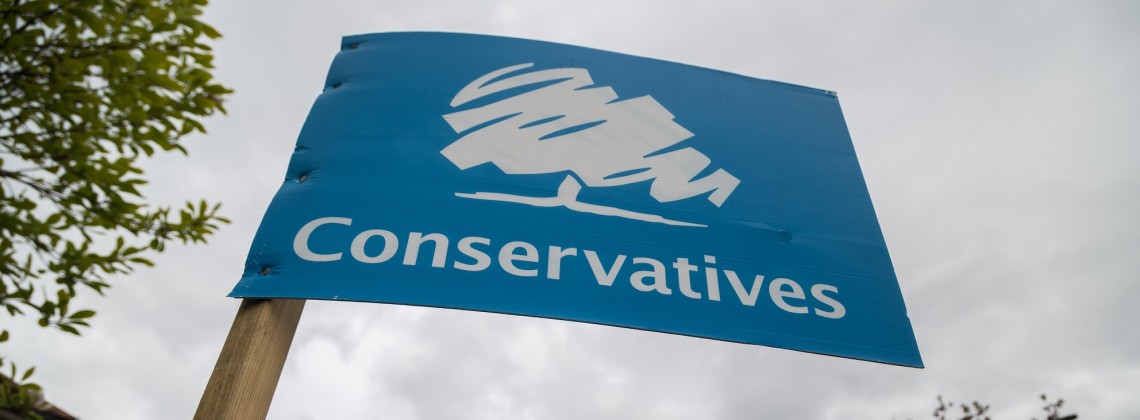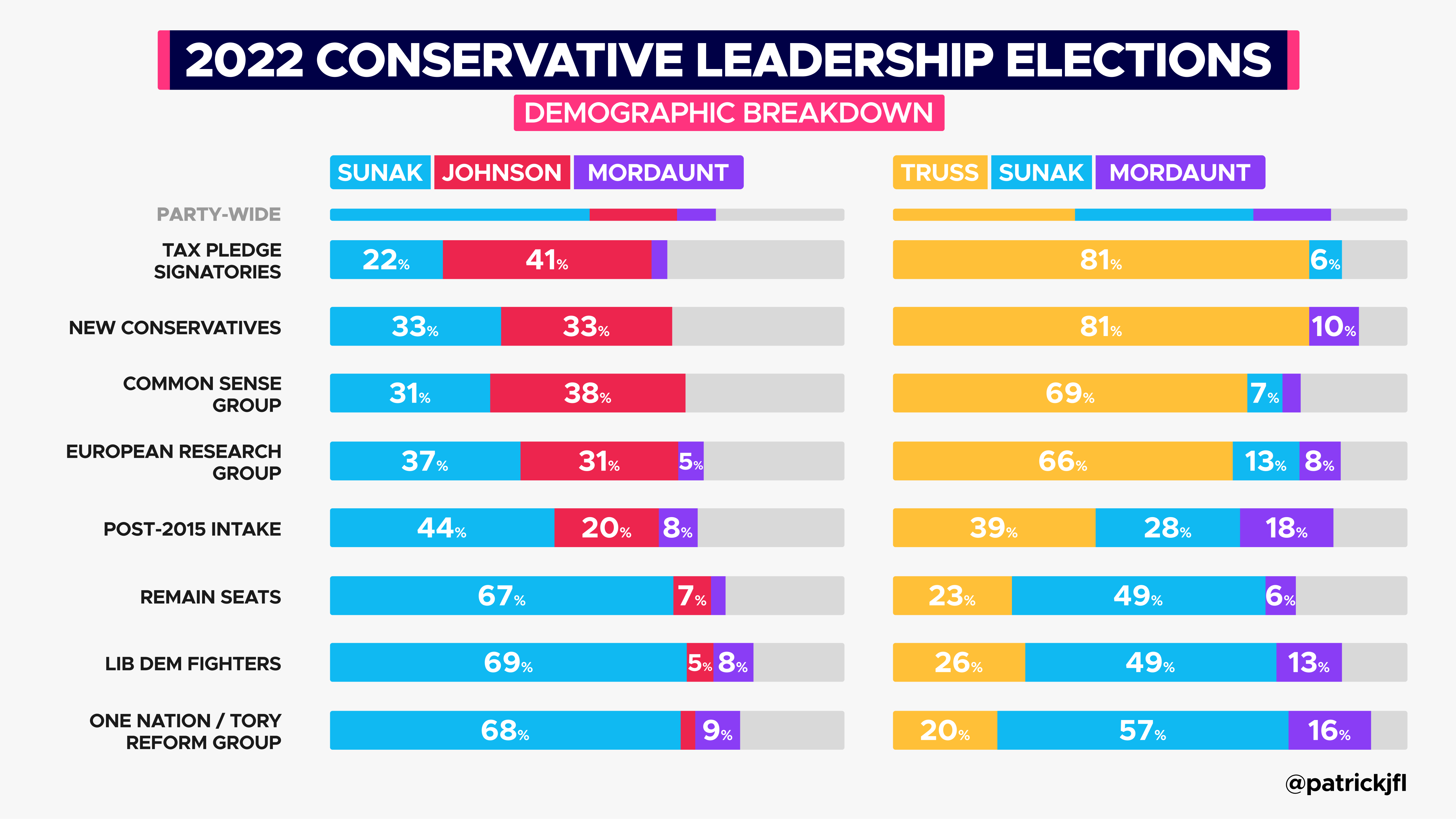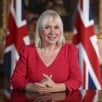
The factions of the Conservative Party that could decide the next PM
Patrick Flynn
18 December 2023
Amid internal divisions over the government’s controversial Rwanda policy, Rishi Sunak faces the prospect of a Conservative rebellion as the bill passes through parliament. The bill’s second reading was approved on Tuesday night, but the third reading will prove trickier. With a potential loss of authority ahead, there have been increasing suggestions that Sunak may not lead the party into the next general election, a prospect which is currently rated just over a 1-in-4 chance.
Whether a leadership election happens soon or after an almost-inevitable election defeat next year, it’s worth looking at which factions of the party wield the most influence.
I’ve broken out the endorsements spreadsheet again and decided to re-analyse last year’s two leadership elections, adding some info on which factions each MP belongs to based on news articles, open letters and Twitter activity. This analysis can illuminate the dividing lines in the Conservative Party and highlight the groups which were most significant in determining the top two candidates.
There are eight key groups in the party, some of which will naturally overlap with each other.
New Conservatives
Despite a count of just 21 publicly-known MPs (the group claims 25), this group on the right of the party was pretty influential in last year’s leadership elections and can act in strong unison when they want to. 17 of them publicly gave their final endorsement to Liz Truss last July despite just four backing her in the first round; not a single one endorsed Sunak. By October, the group was totally divided with an even split between a third who flipped to Sunak, a third who wanted Boris Johnson’s return and a third who did not publicly endorse.
All MPs in this group represent seats with a higher than average Leave share, and their aims centre around pursuing a socially-conservative policy agenda, including leaving the European Convention on Human Rights. Given that any Sunak exit will likely be precipitated by rifts on immigration surrounding the Rwanda policy, this group may sharpen their focus and unite behind their desired successor. They have demonstrated their willingness to compromise in the past, but would be most likely to unite behind someone like Suella Braverman or Priti Patel.
MPs in more ‘Remainy’ seats
In contrast to the heavy Leave constituencies of the New Conservatives, MPs in seats with lower Leave shares were a crucial part of Sunak’s coalition in both the 2022 elections, with around half this group backing him in July and two-thirds in October. While there is no formal grouping of these MPs in parliament, it’s not exactly a stretch to suggest they would have different policy priorities to the New Conservatives. With an average majority around 9-points lower than the average Tory, MPs in Remain seats would be likely to back a safer, less divisive figure in any leadership election.
Tax pledge signatories
Back in September, over 30 MPs signed a pledge to oppose any tax rises in future government budgets, a list which included former PM Liz Truss. Unsurprisingly, over 80% of these MPs backed Truss last July, and despite Sunak winning a clear majority among the wider party in October, just 22% supported him then.

Broadly speaking, the group is an alliance of arch-Thatcherites like John Redwood and Jacob Rees-Mogg, alongside new MPs in former Labour seats in the North of England and the Midlands like Andrea Jenkyns, Jonathan Gullis and Ben Bradley.
Common Sense Group
This is a grouping of some of the most socially-conservative MPs in the party. Among them are Nick Fletcher (Don Valley), who said in a speech on Tuesday that ‘we are turning parts of our community into a ghetto’, and bemoaned that A&E waiting times were so long because ‘people don’t speak English in these places anymore’. Other well-known names include Jonathan Gullis, Brendan Clarke-Smith, Danny Kruger, Lee Anderson and Phillip Davies.
In 2020, a letter sent by some members of the group to The Telegraph was widely criticised by anti-racist groups due to its criticism of ‘cultural Marxism’, a term which has an antisemitic history. Some of the MPs said they were not aware of these connotations and vowed not to use the phrase again.
In terms of endorsements, this group showed some of the highest levels of support for Boris Johnson last October, with 38% of them supporting his return.
European Research Group
The ERG has had a diminished profile post-Brexit, they were still an influential factor in last year’s leadership contests and played a big part in getting Liz Truss into the final two. Despite this, a plurality (37%) opted for Sunak over Johnson in October.
One Nation Conservatives / Tory Reform Group
These two groups represent the left of the Conservative Party and contain some key Sunak allies like Jeremy Hunt and Claire Coutinho. They diverge quite significantly from the party membership at-large, with just 3% backing Boris Johnson’s return and only 1-in-5 supporting Liz Truss’ successful campaign. They are also the most pro-Sunak of any of the eight factions.
Of those at the top of the next Conservative leader market, James Cleverly, Penny Mordaunt or Gillian Keegan would be the most likely beneficiaries of the 70 or so MPs in this faction.
Post-2015 intake
This is probably the key swing group, one which broadly reflected the makeup of the party at-large, backing both Liz Truss in July and Rishi Sunak in October. Of the eight factions, Penny Mordaunt recorded her highest share of endorsements here last July at 18%.
As a 2017 joiner, market favourite Kemi Badenoch might have a good shot with this group in any leadership contest.
Lib Dem fighters
MPs representing seats where the Liberal Democrats are the main opposition obviously overlap a lot with those in Remain-voting constituencies, but this group drove additional support for Sunak in October even on top of each seat’s Remain share.
These kinds of MPs tend to represent constituencies that are more in the Cameronite ilk – more socially liberal but fiscally conservative than the average seat. MPs defending their seats against the Liberal Democrats will likely be concerned about the implications of their party leaning heavily on anti-immigration rhetoric and may opt for a less hardline candidate in a pre-election leadership campaign.
Patrick Flynn
18 December 2023


